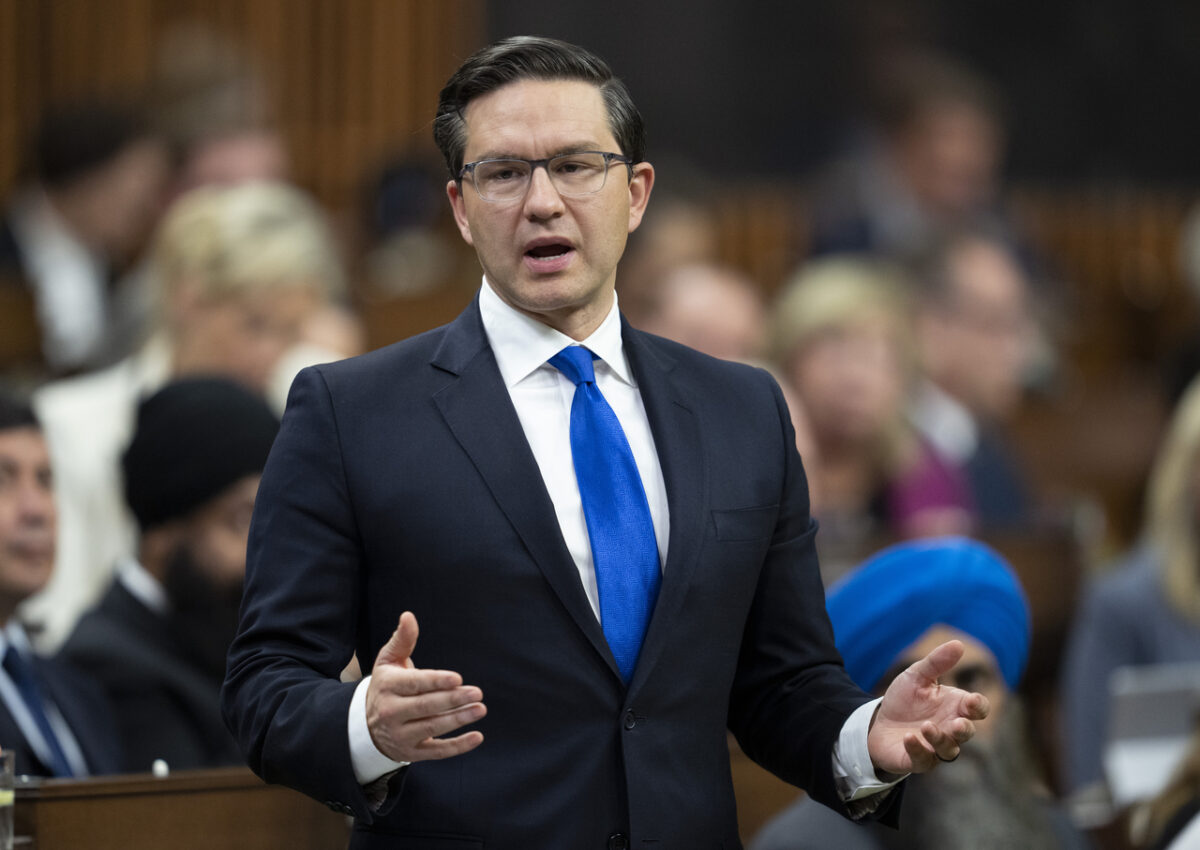Poilievre says House should be recalled as NDP vows to vote down – this high-stakes political showdown pits the Conservative leader against the NDP, creating a fascinating clash of ideologies and political strategies. Poilievre’s call for a recall stems from [briefly explain the core reason, e.g., allegations of government misconduct], prompting a fierce debate about accountability and the future direction of the country.
The NDP’s firm opposition, however, sets the stage for a potential political stalemate with significant implications for upcoming legislation and public perception.
This situation unfolds against a backdrop of [mention key contextual factors, e.g., recent economic challenges, upcoming elections]. Understanding the nuances of Poilievre’s demands, the NDP’s counterarguments, and the potential ramifications requires careful consideration of the political landscape and the motivations of each party involved. We’ll delve into the details of each side’s position, explore the potential scenarios that might unfold, and analyze the likely impact on the country’s political trajectory.
Poilievre’s Call for Recall: Poilievre Says House Should Be Recalled As NDP Vows To Vote Down

Pierre Poilievre, leader of the Conservative Party of Canada, recently called for an emergency recall of the House of Commons. This request, made amidst significant political events, sparked considerable debate and highlighted the ongoing tensions between the governing Liberals and the opposition parties. His call wasn’t a spontaneous reaction but rather a culmination of several factors he felt demanded immediate parliamentary attention.
Context of Poilievre’s Recall Request
Poilievre’s demand for a recall was driven by a confluence of events he deemed critical and requiring immediate parliamentary scrutiny. These events primarily centered around concerns about the rising cost of living, the government’s handling of economic challenges, and specific policy decisions he considered detrimental to Canadians. The timing of his request also strategically aimed to capitalize on public dissatisfaction with the ruling Liberal party.
The absence of Parliament during these times, he argued, prevented proper oversight and accountability.
Reasons Cited by Poilievre for Demanding a Recall
Poilievre specifically cited several key reasons for his call. These included the significant increase in inflation and its impact on Canadian families, alleged government mismanagement of the economy leading to increased debt and deficits, and concerns about specific policies, such as the carbon tax, that he believed were exacerbating the economic hardship experienced by many. He argued that the current government was failing to address these pressing issues effectively and that an immediate parliamentary session was necessary to hold them accountable.
Poilievre’s Proposed Agenda for a Recalled House Session, Poilievre says House should be recalled as NDP vows to vote down
Poilievre Artikeld a proposed agenda for the recalled House session, focusing on immediate action to address the economic crisis. This included debates and potential votes on measures to reduce the cost of living, including potential tax cuts or adjustments to social programs. He also proposed a thorough review of government spending and a commitment to fiscal responsibility. His proposed agenda was framed as a direct response to the urgent needs of Canadian citizens struggling with the rising cost of living and economic uncertainty.
Timeline of Events Leading to Poilievre’s Call for a Recall
A timeline of events leading up to Poilievre’s call would include a series of economic indicators showing worsening inflation, public opinion polls revealing growing dissatisfaction with the government’s economic policies, and the government’s responses (or lack thereof) to these issues. This could also include specific policy announcements from the government that Poilievre and his party strongly opposed, fueling their call for immediate parliamentary action.
The absence of Parliament during this period of escalating economic concerns provided the backdrop for Poilievre to frame his call for a recall as a necessary measure to address the crisis.
NDP’s Stance and Planned Vote

The NDP has clearly stated its opposition to the Conservative Party’s call for a recall of the House of Commons. This decision, while seemingly simple, is rooted in a complex interplay of political strategy, differing perspectives on parliamentary procedure, and assessments of the potential consequences.The NDP’s reasoning for voting against the recall centers on their belief that the current parliamentary session is functioning adequately and that a recall would be an unnecessary disruption.
They argue that Poilievre’s request lacks sufficient justification and is primarily a political maneuver designed to gain media attention and score points against the governing Liberals. They likely view the proposed recall as a waste of taxpayer money and a distraction from more pressing legislative matters. Furthermore, the NDP might be concerned about setting a precedent for frequent House recalls, potentially undermining the established parliamentary calendar and processes.
So, Poilievre wants the House recalled, but the NDP are planning to block it – political theatre, right? It’s like trying to guess their accents; you could use a cool tool like this ai accent guesser to analyze their speeches, though I doubt it’d predict the political maneuvering. Ultimately, the fight over the recall will likely continue to dominate the headlines.
Potential Consequences of the NDP’s Vote
The NDP’s vote against the recall will likely solidify the existing political divide. It will strengthen the narrative that the Conservatives are employing disruptive tactics for partisan gain, while the NDP and Liberals are prioritizing efficient governance. Depending on the broader political climate, this could either boost the NDP’s popularity among voters who appreciate their measured approach or potentially alienate some voters who believe the government should be more responsive to calls for accountability.
Failure to recall the House, even if supported by the Liberals, might embolden the Conservatives to pursue other, potentially more disruptive, methods of expressing their dissatisfaction with the government’s actions. Conversely, it could weaken the Conservatives’ perceived political momentum. The outcome depends significantly on public perception and how the various parties manage the resulting narrative.
Comparison of Arguments: Poilievre vs. NDP
Poilievre’s arguments for a House recall likely focus on the perceived urgency of addressing specific issues he deems critical. He likely frames the recall as a necessary step to hold the government accountable and ensure timely action on these issues. This framing emphasizes responsiveness to public concerns and a commitment to effective governance. In contrast, the NDP’s counter-argument emphasizes the stability and functionality of the current parliamentary session, highlighting the potential inefficiencies and costs associated with an unscheduled recall.
They likely portray Poilievre’s call as a politically motivated stunt, designed to disrupt the government’s agenda rather than solve actual problems. The core difference lies in their prioritization: Poilievre emphasizes immediate action and accountability, while the NDP emphasizes procedural stability and efficient use of resources.
So, Poilievre’s pushing for a House recall, but the NDP are planning to shoot it down. It’s a pretty intense political showdown, kind of like the unexpected twists in the boxing world; check out this crazy match, Usyk vs Fury 2: David Allen drops Johnny Fisher only to lose , for a taste of that unpredictable energy. Anyway, back to the political drama, the whole Poilievre/NDP situation is shaping up to be a real nail-biter.
Potential Scenarios and Outcomes

The NDP’s vote on the motion to recall Parliament presents several possible scenarios, each with significant short-term and long-term ramifications for the Canadian political landscape. The outcome will significantly impact the government’s stability and ability to pass legislation. Let’s examine three plausible scenarios.
Scenario 1: NDP Votes Down the Motion, Maintaining the Status Quo
If the NDP votes against recalling Parliament, as they have vowed, the current political situation remains largely unchanged. The government continues its agenda, albeit potentially facing increased pressure from the opposition. Short-term consequences might include continued public debate and criticism of the government’s handling of various issues, potentially impacting public opinion. Long-term, this scenario could lead to a hardening of political positions, making future compromise and collaboration more difficult.
Government stability would be relatively maintained, but legislative progress might be slowed by increased partisan gridlock. This resembles situations where minority governments have navigated periods of intense political debate without triggering an election.
Scenario 2: Unexpected NDP Support, Leading to a Recall and Potential Compromise
A surprising shift in NDP strategy, resulting in support for the recall, could create a very different outcome. Short-term, this could lead to a period of intense negotiation and potential compromise on key issues. The government might be forced to concede on certain policy points to secure NDP support for legislation. Long-term, this could lead to a period of greater cooperation between the government and the NDP, potentially resulting in the passage of significant legislation.
However, this scenario is less likely given the NDP’s public statements. Government stability would be temporarily challenged by the uncertainty, but potentially strengthened by subsequent cooperation. Legislative progress could accelerate if the parties find common ground. This would be similar to instances where unexpected alliances have led to significant legislative achievements, albeit possibly at the expense of other political priorities.
Scenario 3: NDP Vote Leads to a Snap Election
Should the government interpret the NDP’s vote as a lack of confidence, it could trigger a snap federal election. Short-term, this would lead to an immediate suspension of parliamentary proceedings and a period of intense campaigning. Long-term, the outcome of the election would significantly reshape the political landscape, potentially resulting in a change of government or a shift in the balance of power.
This carries significant risks for all parties involved. Government stability would be severely disrupted, and legislative progress would be completely halted until a new government is formed. This scenario mirrors past instances where minority governments have fallen and triggered early elections, often leading to significant shifts in public opinion and political power.
Comparison of Scenarios
| Scenario | Likelihood | Short-Term Impact | Long-Term Impact |
|---|---|---|---|
| NDP Votes Down the Motion | High | Continued political debate, potential erosion of public trust | Hardening of political positions, slowed legislative progress |
| Unexpected NDP Support | Low | Intense negotiation, potential compromise on policy | Increased cooperation, potential for significant legislative achievements |
| Snap Election | Medium | Suspension of parliamentary proceedings, intense campaigning | Significant shift in political landscape, potential change of government |
The clash between Poilievre’s call for a House recall and the NDP’s vowed opposition highlights a significant power struggle within Canada’s political system. The outcome will likely shape the political narrative in the coming months, influencing public opinion, legislative progress, and potentially even the timing of the next election. Whether the recall happens or not, this event underscores the deep divisions and contrasting priorities shaping Canadian politics today, leaving us to anticipate the next moves in this ongoing political drama.
Questions and Answers
What are the potential long-term consequences if the House is not recalled?
Depending on the specific issues at hand, failure to recall could erode public trust, embolden opposition parties, and potentially hinder legislative progress on important matters. It could also affect Poilievre’s standing within his own party.
What specific legislation is Poilievre hoping to address with a recalled House?
This will depend on the specific context of the situation, but it’s likely to involve issues he considers crucial and believes require immediate attention from Parliament.
How might public opinion influence the outcome of this situation?
Strong public support for either Poilievre’s call or the NDP’s stance could sway public opinion and influence how the situation unfolds. Polls and social media sentiment will play a key role.